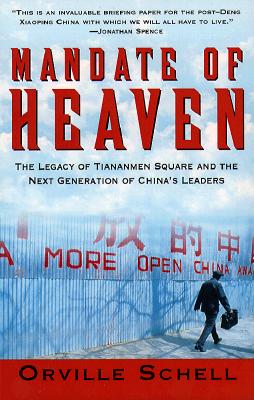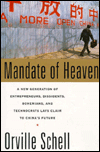



| MANDATE OF HEAVEN: A New Generation of Entrepreneurs, Dissidents, Bohemians, and Technocrats Lays Claim to China's Future Orville Schell New York: Simon & Schuster, September 1994 |
Rating: 5.0 High |
|||
| ISBN-13 978-0-671-70132-1 | ||||
| ISBN 0-671-70132-0 | 464pp. | HC | $25.00 | |
The term "Old China Hand" has a certain connotation that links it to the generation of John Foster Dulles, who (I understand) refused to shake hands with Chou En-Lai (as it was spelled then) and thus incurred the enmity of the leadership of the People's Republic of China (PRC.) It is to those who are Old China Hands in this political, time-bound sense that one might pose the politically-loaded question "Who Lost China?"
Orville Schell is an old China hand in the other, purer sense: He is a journalist who has spent a lot of time in China, has many friends there, and knows the history and culture of the region thoroughly. He also has a Chinese wife. Mandate of Heaven is one of his several books about China.
In it he chronicles the events leading up to the crisis in Tiananmen Square in May of 1989 (for which the televised image of the brave student facing down the tank is the pre-eminent symbol in Western minds, although it happened as the crisis was fading) and the tumultuous changes that grew out of it.
Briefly, what happened was this: Students in the universities around Beijing ("Peking" to Old China Hands), emboldened by the partial relaxation of controls on speech and publication brought about by Deng Xiaoping1 after the Cultural Revolution, took possession of Tiananmen Square in April 1989 in order to lend weight to their demands for still more political freedom. The students, quite simply, sought to bring true democracy to Communist China. And, as factional struggles within the leadership delayed any harsh reprisals, they began to feel they might succeed. Prominent intellectuals such as astrophysicist Fang Lizhi and popular figures like singer Wu'er Kaixi2 gravitated to the students' cause. Soon, the proletariat too — represented by Han Dongfang's Beijing Autonomous Workers' Federation (BAWF) — jumped on the bandwagon. On May 21, the BAWF declared in a manifesto, "The working class is the vanguard class, and we in the democratic movement should be prepared to demonstrate its great power. The People's Republic is supposedly led by the working class, thus we have every right to drive out all dictators." [Pages 185-186]
Alas, these rebels did not reckon with the other "great power" in the PRC — the so-called "People's Army" — which obeyed the dictates of the Party leadership. That leadership, like the imperial dynasties before it, would not tolerate anything that threatened its ultimate power over the nation. So, at the beginning of June, the army fought its way through the barricades in the streets and evicted the thousands of protesters encamped in the Square. Hundreds died.
Then, Deng initiated reforms that brought about a surge of unbridled economic activity. In almost every industry, including the formerly rigidly-controlled publishing industry, entrepreneurs began to supplant the Party functionaries. Veritable tsunamis of foreign capital flooded into the four Special Economic Zones established by Deng (and into Shanghai, which was not about to be left high and dry) and whole cities were rebuilt in just months. Little concerned about the quality of construction, culture, or the local environment, these newly minted tycoons quickly garnered wealth beyond their former dreams of avarice. As deleterious to the long-term health of China as this financial typhoon might be, it did have the effect (intentional or not) of distracting many of the dissatisfied from thoughts of political protest.
Schell's account is well-researched and highly detailed. Indeed, in Part I of the book, where he describes the growth and failure of the rebellion virtually blow by blow and communiqué by communiqué, it is almost too detailed. Also, throughout the book, the profusion of Chinese names made me wish for a list of players. However, I know that Schell was writing immediately after horrific events which harmed many of his friends and associates, and about which he himself felt strongly. There is not a thing wrong with recording every scrap of the story one can acquire in a first account. Reflection can come later.
I don't mean to imply that this work is in any way lurid or lacking in reflection. Schell cites imperial precedents in a number of places, most notably in recounting how Mao Zedong's victorious "People's Republic" usurped the symbolic importance of Tiananmen Square to the Imperium it overthrew as the central focus of political power. As gruesome as it is in describing the massacre of June 1989, and as distressing as the tale of the subsequent environmental calamities may be, the book presents vital information in a very readable narrative that I highly recommend.
If Mandate of Heaven has any significant defect, it is that Schell sometimes forgets his readers are not as familiar with China as he is. For example, on page 114 he compares an appearance on Chinese television by Wu'er Kaixi and other protesters with "having the Eight Immortals of Daoist legend materialize on their TV screens." How many Western readers know of the Eight Immortals? And on page 135 he makes reference to the Jianguomenwai diplomatic compound without identifying it. But, in general, Schell is conscientious about defining terms and identifying named individuals.
An excellent index helps with that host of Chinese names. Schell's "Notes on Sources" section includes many books on modern Chinese history.

 To contact Chris Winter, send email to this address.
To contact Chris Winter, send email to this address.